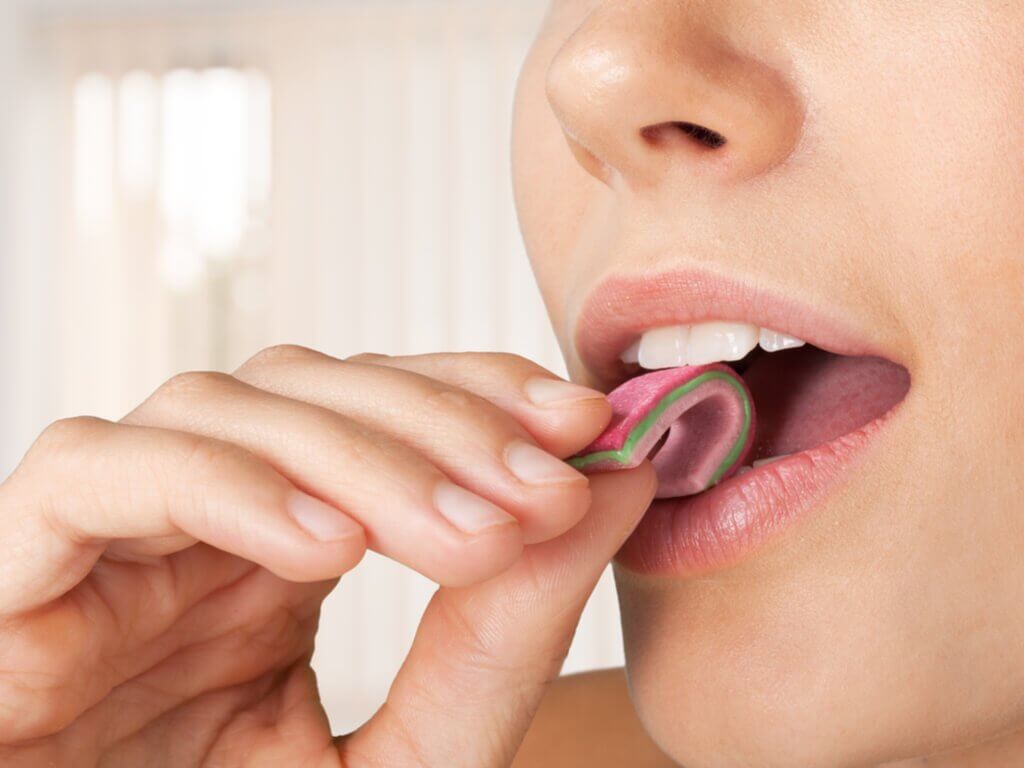What Happens to Your Body when You Chew Gum?


Reviewed and approved by Doctor Carlos Fabián Avila
A piece of gum can seem harmless. However, that’s not completely the case. The aim of this article isn’t to cause panic but to raise awareness about what happens in your body when you chew gum. We often reach for a piece when we’re stressed, hungry, or simply out of habit.
When you chew gum, its sweet flavors and chewy texture can become addictive. That’s why in this article, we’ll review the advantages and disadvantages of chewing gum every day.
Gum: good or bad?
Gum isn’t harmful if you brush your teeth after chewing some. With proper oral hygiene, there’s no reason for it be a bad thing.
For many people, gum helps them to relax, distract themselves, and fight stress. It can also be a way to reduce afternoon cravings. Let’s take a closer look.
Advantages of chewing gum
1. Better concentration

Check out this article: Natural Remedies and Healthy Habits to Lower High Cortisol
2. Reduced appetite
It’s been said that gum helps to fool your stomach so you can avoid eating constantly. This is especially beneficial for avoiding foods that are poor in nutrients like sweets and soft drinks, among others.
3. Say goodbye to heartburn

Chewing gum stimulates saliva production. As such, food and liquids can pass through the esophagus more easily. Consequently, your body can neutralize the acid that moves through there more efficiently.
Flavors such as peppermint, spearmint, and eucalyptus are especially recommended. Fruity flavors can be unpleasant as they can cause stomach aches.
Disadvantages of chewing gum
1. Excess sugar can lead to excess weight
Like any other candy, gum is made of refined sugar, additives, and other chemical components. This makes it an unhealthy sweet treat that, if consumed regularly, can lead to binge eating foods with little nutritional value.
2. Watch out for aspartame

Aspartame is a sweetener that’s used in sugar-free gum. This ingredient contains phenylalanine, a substance that’s harmful to those with phenylketonuria, a hereditary condition that affects the brain.
3. A dangerous laxative
Sugar-free gum contains sorbitol, a laxative that, if consumed excessively, can cause chronic diarrhea and stomach pain. Jurgen Bauditz, a German gastroenterologist, recommends not exceeding five grams of sorbitol per week.
4. Jaw pain

Chewing gum forcefully can lead to issues with properly closing your jaw. This happens when the temporomandibular wears down (the joint that allows you to open and close your mouth).
Recommended reading: Epigastralgia: That Annoying Pain in the Pit of Your Stomach
5. Cavities, plaque, and other issues
Sugar from gum can stay stuck on your teeth, allowing bacteria to accumulate, and leading to the development of cavities, plaque, and other oral health issues.
For this reason, dentists don’t recommend gum. If you do choose to chew it, make sure to brush your teeth immediately after discarding your gum.
6. It contains products derived from sheep

Gum contains lanolin, which is derived from sheep’s wool. It’s a waxy substance that keeps your chewing gum soft. Even though it hasn’t been deemed harmful to health, the contrary has also yet to be proven.
Keep in mind that chewing gum can be positive if you know how to take advantage of its benefits. However, dietitians will tell you it’s important that you don’t consume it excessively and to be aware of how it can be harmful if you don’t take precautions.
Remember that, ultimately, you’re the one who will decide how to move forward. Candy can be in front of you, but you’re the one who chooses how to “use” it.
All cited sources were thoroughly reviewed by our team to ensure their quality, reliability, currency, and validity. The bibliography of this article was considered reliable and of academic or scientific accuracy.
- Park E., Edirisinghe I., Inui T., Kergoat S., et al., Short term effects of chewing gum on satiety and afternoon snack intake in healthy weight and obese women. Physiol Behav, 2016.
- DiNicolantonio JJ., Lucan SC., O’Keefe JH., The evidence for saturated fat and for sugar related to coronary heart disease. Prog Cardiovasc Dis, 2016. 58 (5): 464-72.
This text is provided for informational purposes only and does not replace consultation with a professional. If in doubt, consult your specialist.








